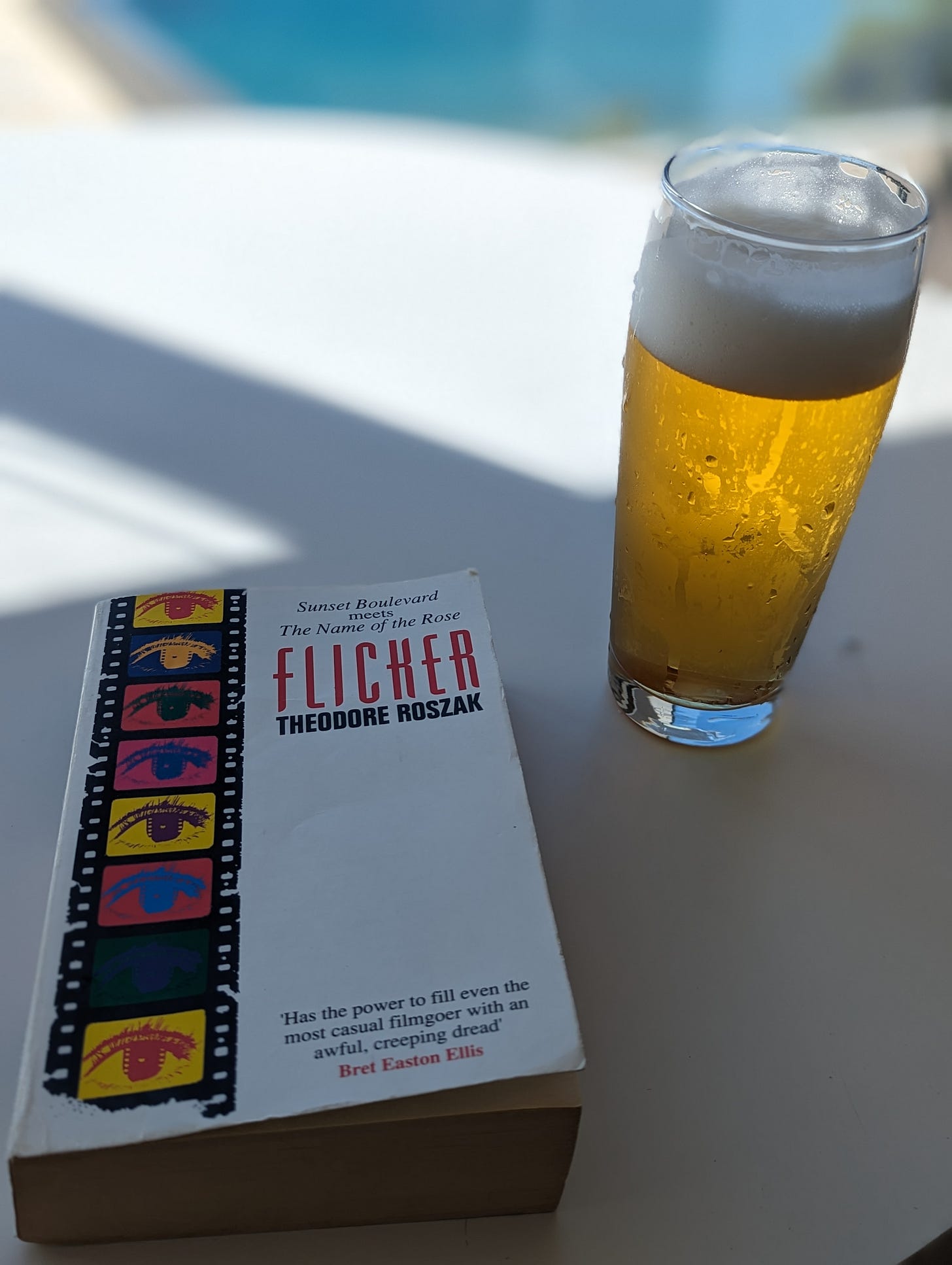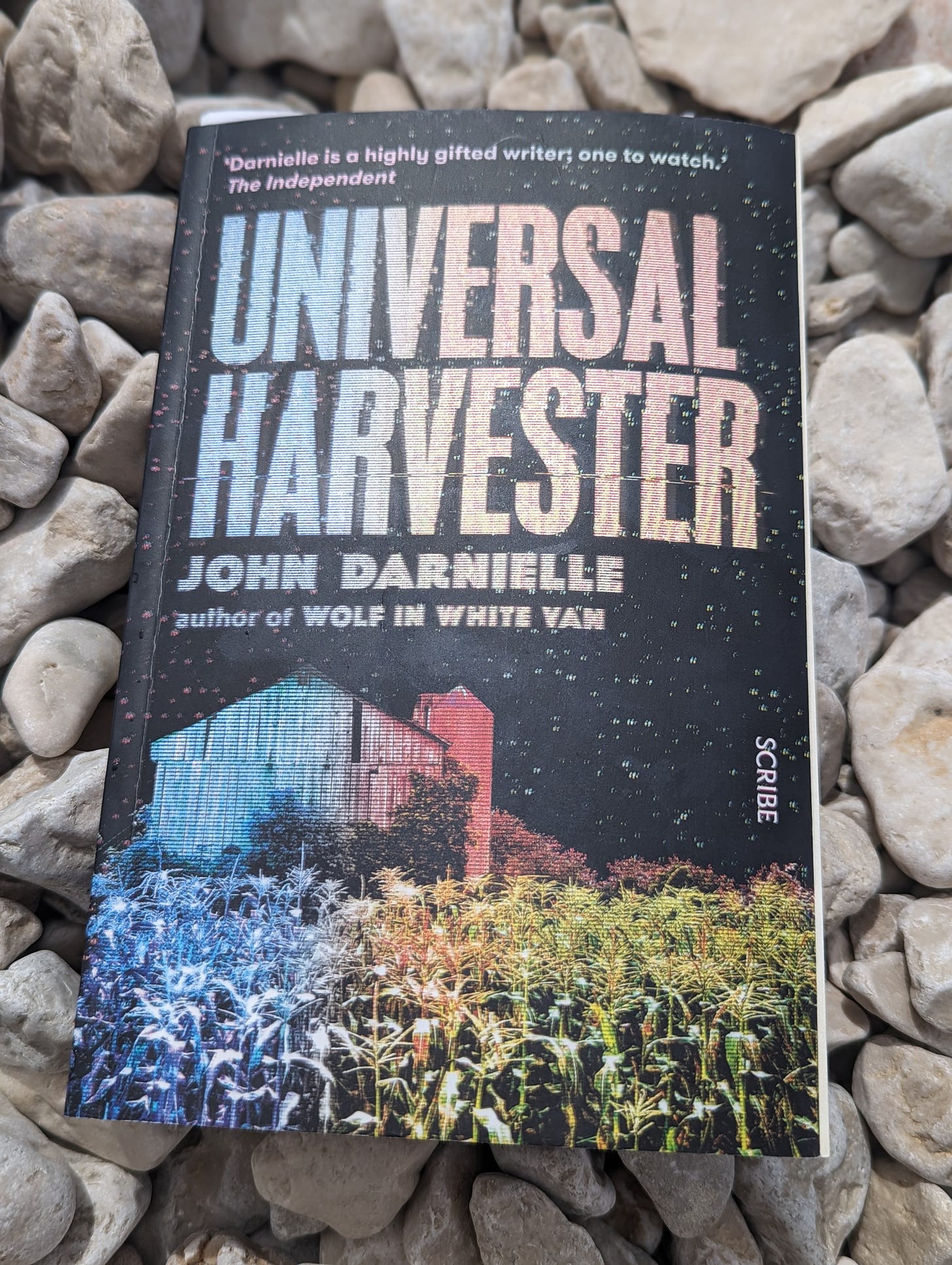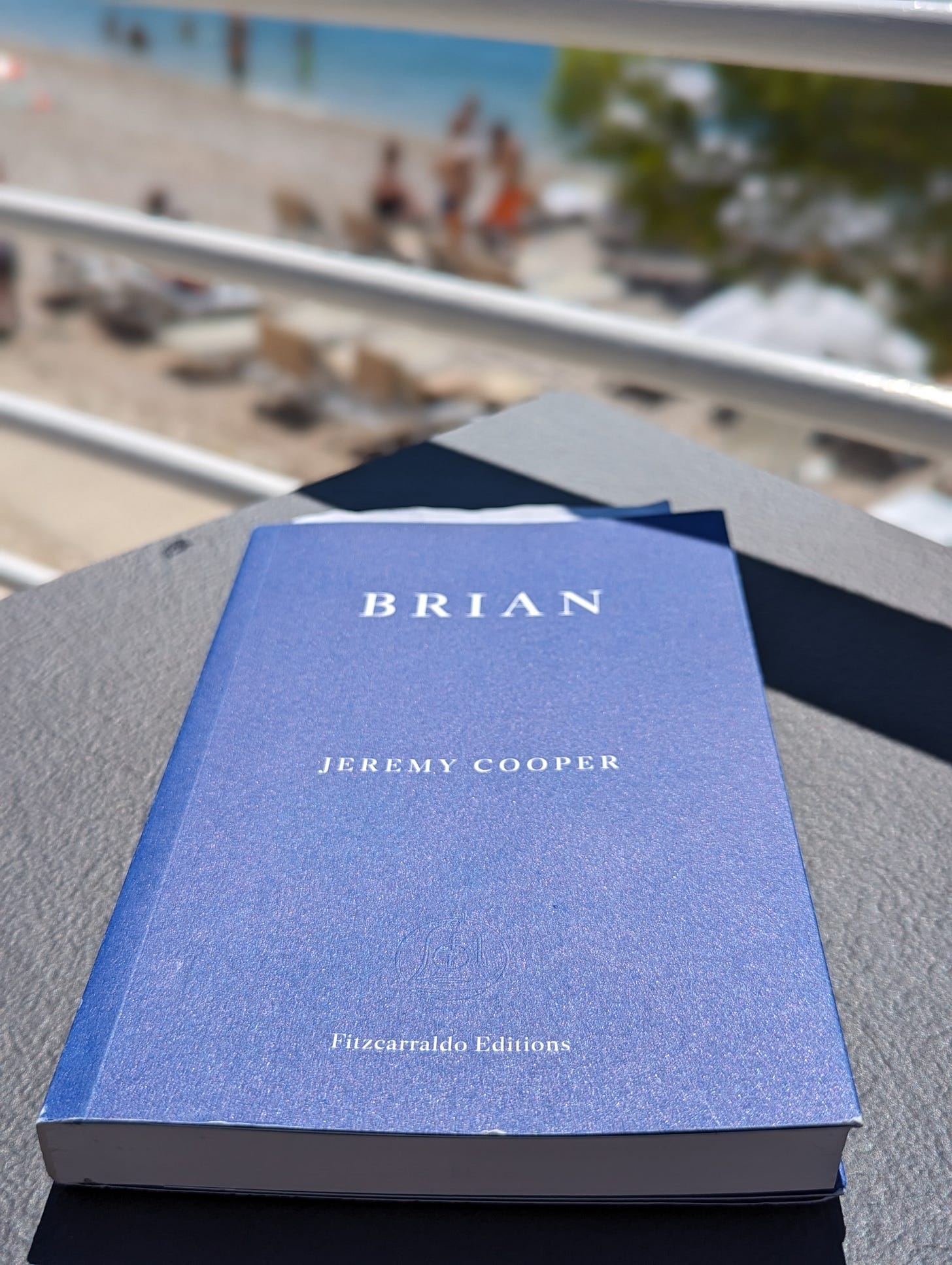Cinéclub Digest #4
Summer reading, featuring four film-related novels and the memoir of a documentary titan.
Autumn may be closing in, but I’m just now getting round to collecting my thoughts on some summer reading.
Theodore Roszak’s Flicker is a classic of a niche mini-genre: novels that centre around films which are in some way haunted, cursed, evil, or at the very least, hold some sort of intangible malign influence over those who watch them. Similar devices can be found in Tim Lucas’ Throat Sprockets, Steve Erickson’s Zeroville and some of the other titles that will be featured in this post. It makes sense that this is a popular device for cinephile authors: the intangible power of film is mysterious enough to have occupied deep philosophical thinkers for many years. This can be a beautiful thing, but it’s frightening, too. Reading Flicker, I thought of 1970s apparatus theory, as discussed by Christian Metz and Jean Louis Baudry, which seemed to suggest an audience almost helplessly under the sway of the flickering images on screen. Baudry and Metz take as read that this is, more often than not, an instrument of that nasty dominant ideology. Roszak expands on this to consider the idea of film as a tool for active evil, making use of mysterious subliminal imagery to deliberately break the minds of the audience. It’s a silly, pulpy idea, but draws from some intelligent sources. I wouldn’t be surprised if Roszak has read his Christian Metz, for example, since other key film studies texts such as Sigfried Krauceur’s From Caligari to Hitler are namechecked repeatedly.
I decided to take it on holiday this year, having read it once, about a decade ago. I may have been subconsciously influenced by a faint memory of the endorsements printed on the back cover, one of which reads, "Take this thing to the beach and be prepared to skip lunch, maybe dinner as well." Whilst I certainly didn't miss any meals over it, Flicker is, for all far-fetchedness, genuinely unsettling at times. It centres around Max Castle, a fictional German Expressionist turned Poverty Row hack, whose films, we slowly discover, connect to a vast, convoluted conspiracy. Initially, though, the elusive strangeness of his films is well realised: I think many film lovers have had similar experiences with films that not only depict evil, but just feel evil in a way which is difficult to articulate. Roszak captures this well. The only real-life precedents for Max Castle’s subliminal propaganda films are cheap, laughable gimmicks like Terror in the Haunted House, but some of the bona fide titles weaved into the novel’s plot, such as The Black Cat and The Cabinet of Dr. Caligari, retain their spooky power today. The book is badly blighted by Roszak's adolescent manner of writing about women, which he does frequently and often for reasons only tenuously connected to plot. I did a lot of eye-rolling whilst re-reading Flicker: others may not get past the first few chapters.
Gemma Files’ Experimental Film is in a similar wheelhouse, but in this narrative, film is actually, actively dangerous. Files’ cinematic preoccupation is nitrate, a now vanishingly rare film stock that is prone to burst into flames that, stoked by oxygen, are very difficult to extinguish. This seems appropriate, because the central spooky movie in Experimental Film is malignant in a way that goes far beyond the psychological trickery of Max Castle’s ouvre in Flicker. Files’ book could perhaps be classified as ‘weird fiction’, that subgenre which, according to Mark Fisher’s definition of the term “weird”, explores parallel worlds and entities that suggest that “the categories which we have up until now used to make sense of the world cannot be valid.” Our protagonist, Lois Cairns, is an academic coasting in an unrewarding teaching role when she discovers a mysterious pioneering early filmmaker. Her obsession with this director opens up a Lovecraftian gateway extending some hundred years into the past.
The cheap cover design of the paperback gives a fairly accurate impression of the prose within. It looks like a novelisation of The X Files, perhaps a deliberate connotation by the publishers, playing on the author’s (presumably pen) name. Experimental Film is fun in a slightly tacky way, and is conceptually strong. Some of the writing is, however, unforgivably clunky. Whilst I certainly don’t need my protagonists to be cheerfully “relatable”, it is difficult to stick with a novel whose central character is so annoying. Lois fills page after page with witless sass, saying things like “the fuckitty fuck?” to express disbelief: when an antagonist tells her, “You really are as big a bitch as people say”, she replies, “Yeah, probably. Care to get specific?” If I rolled my eyes at Flicker, I winced when reading Experimental Film.
I also have reservations about the portrayal of Clark, Lois’ autistic son. In some respects, it is admirable and worthwhile to explore the difficult realities of being a parent to an autistic teenager, and Lois’ anxiety around her inability to fulfil a stereotypical nurturing role is refreshingly honest. However, that’s not what this book is about, and it feels dodgy to use an autistic person as a plot device in this way.
In both Flicker and Experimental Film, cinema’s murky power is closely connected to the materiality of film and the experience of watching flickering celluloid. John Darnielle’s Universal Harvester is preoccupied instead with the warbly VHS of the late 90s and early 2000s. The low-fidelity video images Darnielle describes evoke not German Expressionism or early silent film, but self-taped terrorist propaganda tapes, snuff films and night-vision surveillance footage. The plot revolves around a mysterious incident in which snippets of unsettling video imagery are found seamlessly inserted into VHS copies of films as diverse as Targets and She’s All That. The power of the idea lies in the home comforts of video rental culture: to watch a haunted film in a dark cinema might be scary, but there’s something just as frightening about the about the idea of someone deliberately sabotaging your movie night with sinister imagery, intruding on your solitary sweatpants-and-pizza vibe.
You may, like me, know Darnielle best as the musician behind The Mountain Goats, a (mostly) solo acoustic project turned full band. This is one of several Darnielle novels, and explores some preoccupations found in his often superb lyrics. There’s an affectionate attachment to small-town America at its least fashionable, for one thing. There is also a productive tension between high and low brow in his work: he loves unsubtle metal music, but writes incredibly tender songs with lyrics that read like devastating short stories. Similarly, Universal Harvester is clearly born of a love of horror fiction, but written with a level of conceptual sophistication and literary ambition you don’t tend to get with Stephen King. The book is not about film in the same way as Flicker or Experimental Film, but of these three macabre novels, is probably the best.
Also on my poolside reading list was Brian by Jeremy Cooper, another novel about film but with little in common with the previous three. It’s a difficult book to summarise: I feel whatever I say will fail to capture why I loved it so much, but let’s see. The eponymous Brian, a regular at London’s BFI Southbank cinema, is of a type familiar to anyone who has visited that, or just about any other, London cinema (he’d be right at home at the quirky Cinema Museum in Kennington, for example). These chaps (and they are usually chaps) are sometimes referred to as “bagmen”, accompanied as they usually are with tatty shopping bags, stuffed to the gills with who-knows-what: perhaps decades’ worth of BFI screening notes and old copies of Sight and Sound? In fact, Brian himself is rather neater, silently critical of his tribes’ shambolic appearance: spiritually, though, he is a bagman through and through.
It’s easy to poke fun at the often socially unconventional bagmen, but Cooper portrays them with obvious affection, considering Brian and his friends cinephiles of the highest order. It is for this reason, I think, that most of the endorsements I’ve read make it seem more grandiose, and perhaps more trite, than it is, summarising it as some kind of “love letter to cinema” (I am dismissively paraphrasing, I admit) which is far too simplistic. The book’s strongest asset is its remarkably flat prose: it is written in a clipped, matter-of-fact manner that eschews any kind of sentimentality. This applies to Brian’s views on the films he sees at the BFI, presented as capsule reviews: for example:
“A dedicated fan of the BFI protégé Derek Jarman, Brian was grateful to him for his screen reveal of [Tilda] Swinton’s pale framed by long red hair, years before Siegel’s The Deep End made her a Hollywood star.
The latter a tedious thriller, in Brian’s opinion, in spite of Swinton.”
However, the passages that focus on Brian’s personal life are no more elaborate. Childhood trauma is slowly revealed with enormous subtlety. His loneliness, as well as his clear affection for his filmgoing friends, is unspoken, and so merely inferred in Cooper’s prose. The book’s conclusion which, if read out of context, might seem utterly inconsequential, is loaded with enormous pathos and unexpectedly had me wiping tears from beneath my shades on a Croatian beach.
Edit: Claude Lanzmann’s trenchant support for the state of Israel is an uncomfortable thread in his memoir. At the time of writing, I decided to gloss over it. Let me now unabmiguously add: free Palestine.
To round out my summer reading, a non-fiction find: Claude Lanzmann’s memoir, The Patagonian Hare. I discovered this in a local flea market not long after watching Lanzmann’s epochal documentary Shoah, and excitedly snapped it up. I then spent the next few days struggling through what is, at times, a surprisingly dull read. If, like me, you approach this book looking for the story behind Shoah, strap in. Whilst there are references to the film throughout the meoir, the words, “It is here that the adventure of Shoah begins” appear only on page 411. This is, I admit, an unfair criticism. Lanzmann lived a life before this film, and in many regards he is fascinating. Much time is dedicated to his experience in the French Resistance as a teenager, his time in the Second World War, his close friendship and collaboration with Jean-Paul Sartre and his romance with Simone de Beauvoir. Much of this is related in a surprisingly bland fashion, however, with long, name-dropping transgressions that often had me skipping several pages at a time.
The rambling structure is sometimes good fun, but Lanzmann could perhaps have benefitted from a more assertive editor, who might have cut some of the mundane, unintentionally funny asides. Take this reverie of childhood that reads like something from the parodic Alan Partridge autobiography:
“I should say that ham of that quality no longer exists: the flavour was exquisite, my grandmother kept it in a meat-safe of fine wire mesh, which she hung from the ceiling of the cool cellar next to the ‘old house’. Nowadays, a fridge keeps the best ham fresh for only a couple of days, but the slices my grandmother bought stay fresh for a whole week.”
Lanzmann’s near-total self-belief is apparent throughout the book. He relates several brushes with death, usually the result of him setting out into dangerous wilderness without adequate clothing or supplies, or in dangerous conditions. He is, admittedly, self-deprecating in recalling these incidents, and they are revealing. Only a man who believes himself capable of anything could make a film like Shoah. These self-effacing moments are endearing, but rare: more often he is self-congratulatory. Perhaps the importance and quality of his work justifies this, but it’s a little off-putting.
A section on his visit to North Korea is fascinating, and formed the basis of a later film, Napalm, which has received only a limited release and which I haven’t seen. It involves a brief romance between Lanzmann and a local nurse: as Richard Brody puts it in his review of Napalm, the story of their fling is “as much a tale of derring-do as of passion, of resistance as of oppression”. All this is true, but it also typifies one of the book’s less attractive themes, which is stories about women, all of whom seem to find Lanzmann utterly irresistible.
If Lanzmann makes us wait for the Shoah stories, it is more than worth it. Watching the film, I was continually amazed at how he had persuaded these people to open up on camera, and here you get a sense of the enormous, fraught task compiling this film was. A story about an aborted hidden-camera interview with a former SS officer is as intense and frightening as anything in the film itself. I’m sure I’ll return to Shoah again and again throughout my life, but if I had my time again, I’d skip the first 410 pages of The Patagonian Hare.








